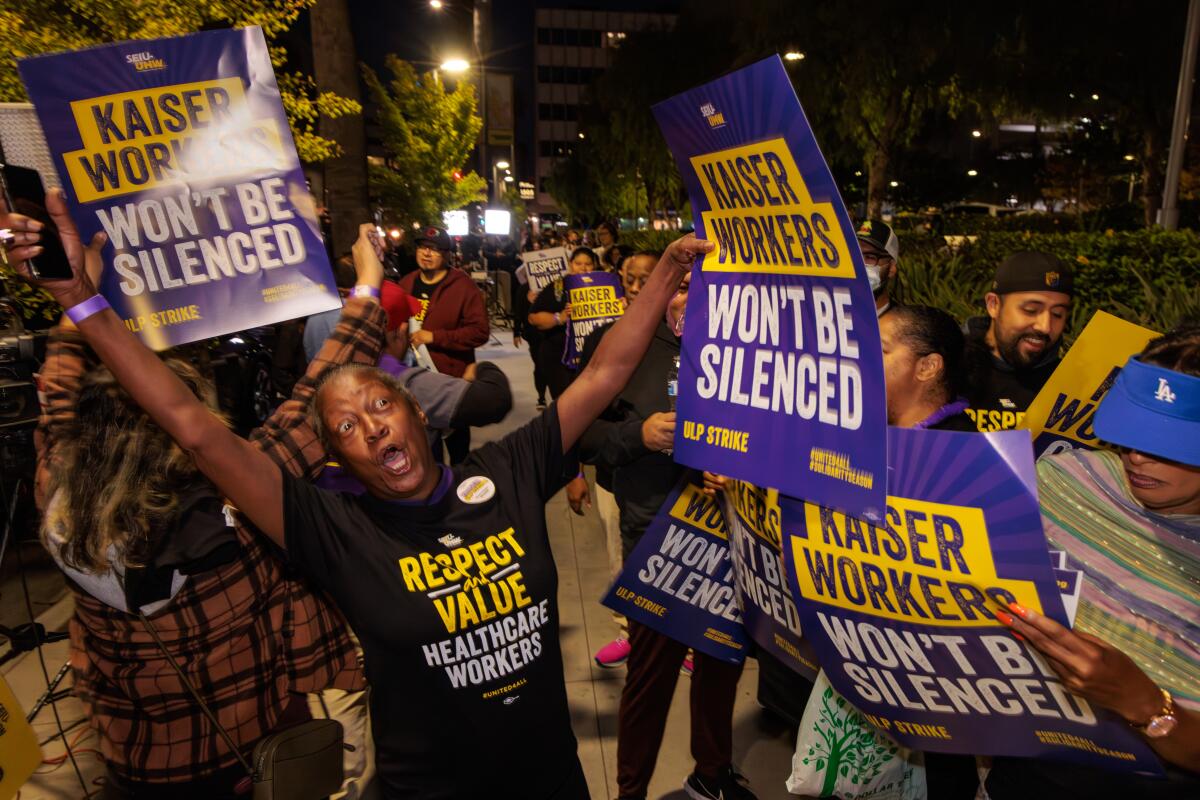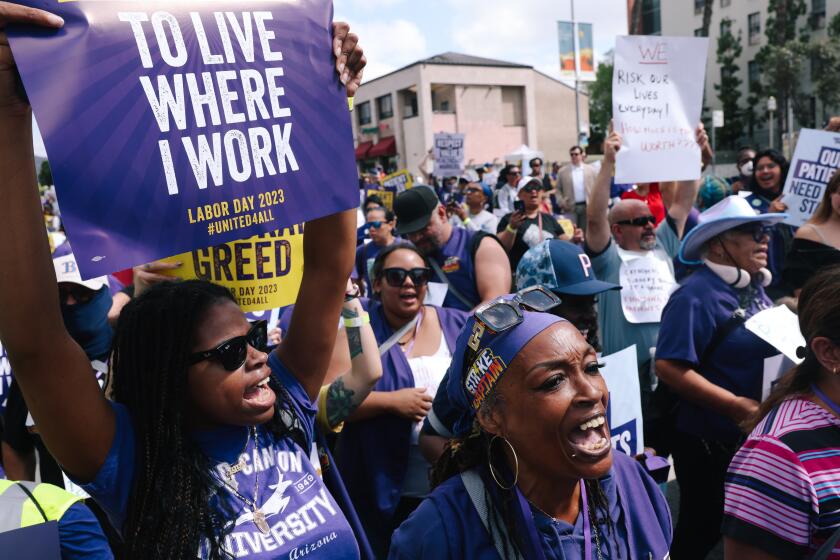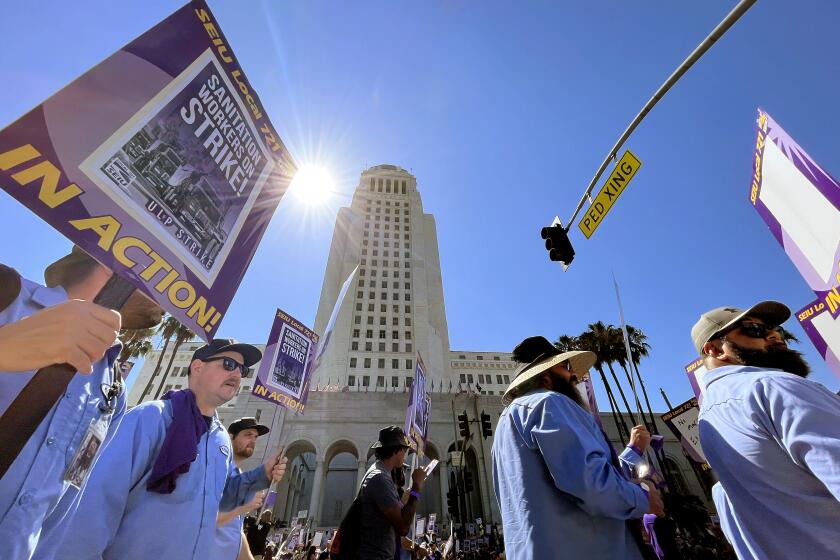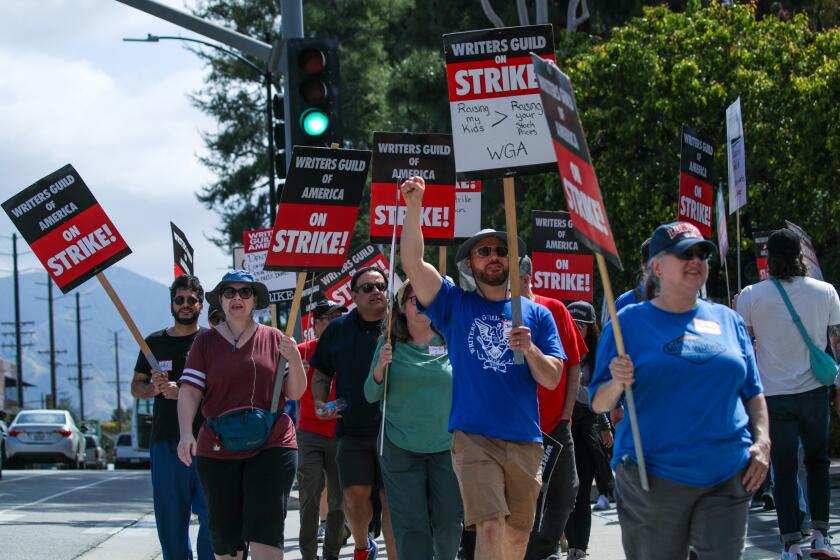Huge strike could happen at Kaiser health facilities starting Wednesday. Hereâs what we know

Tens of thousands of Kaiser Permanente employees in California and other states plan to go on strike Wednesday after union contracts expired for a huge swath of the Kaiser workforce.
The planned strike involves several labor organizations that are part of the Coalition of Kaiser Permanente Unions. The biggest is SEIU-United Healthcare Workers West, which represents nearly 60,000 employees in California.
Unions and the healthcare giant have been grappling over wages and other employee issues that coalition leaders argue have contributed to chronic understaffing. Labor leaders have accused Kaiser executives of not bargaining in good faith to address those problems.
Kaiser says it is committed to reaching a fair deal and that it has weathered staffing issues during the COVID-19 pandemic better than other healthcare organizations due to its wages, benefits and other employee support.
Tens of thousands of Kaiser Permanente employees plan to strike as time runs short to reach contract agreements with the healthcare giant.
Hereâs what we know about the planned strike:
Will this be a big deal?
Yes. The strike could include more than 75,000 Kaiser Permanente workers in California, Oregon, Washington, Colorado, Virginia and D.C. Thatâs more than a third of the Kaiser workforce across the country.
Union leaders say it would be the biggest strike by healthcare workers in U.S. history.
How long will it last?
In California and several other states, the strike is scheduled for Wednesday, Thursday and Friday unless unions and Kaiser Permanente reach an agreement to avert it. No immediate plans to extend the strike beyond three days have been announced.
In Virginia and D.C., the strike is planned only for Wednesday, according to Kaiser Permanente.
Will doctors be going on strike?
No, but the strike involves many other workers who care for patients or support hospital operations.
Which kinds of healthcare workers are going on strike?
There are a lot of them, including medical assistants, licensed vocational nurses, surgical technicians, certified nursing assistants, phlebotomists, pharmacy technicians, respiratory therapists, X-ray technicians and ultrasound sonographers. Food service workers and housekeepers will also be on strike.
Whatâs happening now feels different. Thereâs a level of cross-union support across radically different workplaces, along with a knowledge of one anotherâs respective struggles, that Iâve never seen, or frankly ever thought possible.
The majority of the Kaiser workforce is unionized, but not all of the unions that represent its employees are taking part in the three-day strike.
For instance, many of the registered nurses working at Kaiser Permanente facilities in Southern California belong to unions that arenât part of the coalition. (That doesnât mean they donât support the strike: United Nurses Assns. of California/Union of Health Care Professionals, for instance, said it stands in solidarity with the coalition.) The ones making strike plans do include SEIU 121RN, which represents registered nurses at Kaiser Permanente Moreno Valley Medical Center.
How will patients be affected?
Kaiser Permanente said that if a strike occurs, it has âcontingency plans in placeâ to ensure patients can continue to get care. It said that its hospitals and emergency departments will remain open and staffed, in some cases with the help of âcontingent workers.â
âIn the case of a strike, we may need to reschedule some non-urgent appointments and procedures,â Kaiser said in a message to members over the weekend. âWeâll contact you in advance if your appointment needs to be rescheduled. Itâs possible that you could experience longer wait and hold times during a strike.â
Kaiser officials avoided naming specific kinds of care that would be affected, saying their goal was to continue usual operations as much as possible. âOur goal is to have minimal disruption,â said Michelle Gaskill-Hames, president of Kaiser Permanente Southern California and Hawaii, Health Plan and Hospitals.
Will someone tell me if my appointment is canceled?
Kaiser will reach out if specific appointments are canceled and work with patients to reschedule them, Gaskill-Hames said, âbut I would not discourage members from seeking a particular type of care.â
She said the health system is working to marshal its own employees to fill needs during a strike, as well as bringing in an unspecified number of âreplacement workersâ in âcertain key areas.â
She encouraged Kaiser members to check its website for updates.
What about pharmacies?
Kaiser said inpatient pharmacies at its hospitals would remain open and that it was exploring options for using retail pharmacies such as Rite Aid and Walgreens to serve members if any of its outpatient pharmacies close. In Southern California, all pharmacies will remain open, according to a spokesman for Kaiser Permanente Southern California.
Gaskill-Hames said the health system conducted outreach ahead of the planned strike âto try and alert our members that if they need medications, to try to get ahead of it with mail-order pharmacy.â
Can I still get a COVID-19 booster shot during the strike?
Gaskill-Hames said that Kaiser facilities have started to offer the COVID booster and âwe have prepared to be able to continue to do that as best we can.â
The new COVID shot is available at CVS and Walgreens at no cost through most insurers. But Kaiser enrollees must wait until Sept. 28 to avoid paying out of pocket.
Why is this strike happening?
The Coalition of Kaiser Permanente Unions says its members agreed to the strike to protest âbad-faith bargainingâ by the healthcare giant during negotiations.
Union leaders say theyâre looking for solutions to address a âstaffing crisisâ that harms both employees and patients, dragging out wait times and putting patient safety at risk. They also say the wage increases Kaiser has offered donât keep up with the rising cost of living. Labor leaders have also balked at Kaiser proposals to offer wage hikes of different sizes in different regions, calling it a âdivide-and-conquer strategy.â
Kaiser Permanente said it had negotiated in good faith and that the raises it proposed would ensure it remains an industry leader on wages. It also said it has worked hard to address staffing and is on track to hire 10,000 new people by the end of October to fill jobs represented by the union coalition.
The healthcare organization argues that wage increases need to reflect what similar workers make in different regions, with bigger raises in areas where Kaiser pay isnât at least 10% above local levels. Kaiser also needs to balance affordability of care for its members, it says.
Are the two sides close to making a deal?
Kaiser Permanente said it had reached tentative agreements with the unions on some issues, such as the use of temporary workers such as traveling nurses and how employee vacancies are tracked. It said Sunday it remained optimistic that an agreement would be reached to avoid a strike.
The recent run of wins in the Legislature for organized labor was remarkable. Now Gov. Newsom must decide if union-backed bills will become law.
For its part, the union coalition said there had been âgood discussionsâ on some issues and a âpath to resolutionâ on topics such as remote work. âOn important issues, though, we remain far apart,â the coalition said Saturday.
Negotiations continued into Monday, and SEIU-UHW spokesperson RenĂŠe SaldaĂąa said union leaders are willing to keep talking to Kaiser executives âas long as theyâre not bargaining in bad faith.â
âWe are still preparing for a strike to happen on Wednesday morning,â she said, âbut Kaiser executives could stop this from happening at any time if they just listened to the healthcare workers.â
Gaskell-Hames said âwe are committed to staying at the table as long as we need toâ to avert a strike. In a statement, Kaiser Permanente said the planned strike âis not inevitable, and it is certainly not justified.â
What happens after this strike ends?
The coalition has warned that if Kaiser âcontinues to commit unfair labor practices,â a longer strike could follow in November. By then, they could be joined by additional workers in Washington state whose contract ends Oct. 31.
More to Read
Sign up for Essential California
The most important California stories and recommendations in your inbox every morning.
You may occasionally receive promotional content from the Los Angeles Times.















